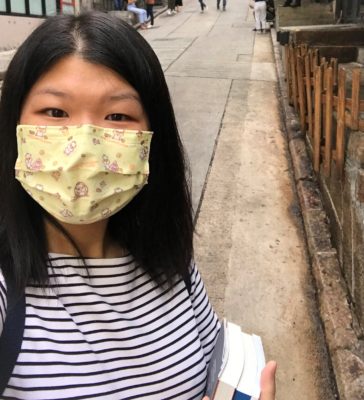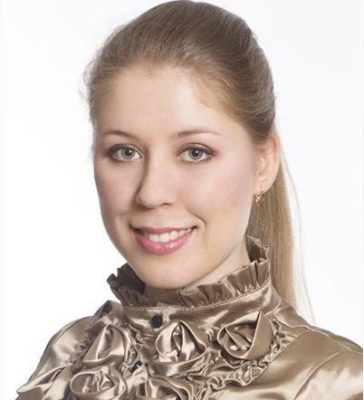
Wing Sze Hung
Current Employer/Organisation Name
Fire Services Department, Hong Kong Special Administrative Government
What have you been doing since leaving Exeter, and what are you doing now?
I joined FILA Hong Kong in Feb 2019 as a translator/interpreter for the Irish Design Director, then became an Official Languages Officer of the Hong Kong Government in Sep 2019 and have been working under the Fire Services Department until now. My main duties include translating articles from Chinese to English and vice versa, vetting Chinese and English materials and drafting Chinese apothegms/couplets etc. I also work for the Duty Lawyer Service after office hours to provide interpretation while foreign lawyers offer their legal advice to non-English speaking residents.
Why did you choose this career? And what do you enjoy most about your work?
I did my bachelor degree in translation in Hong Kong and I always enjoy working with languages. I worked for a private translation company before travelling to Exeter but had a very horrible experience there (seriously underpaid, boss is a hypocrite who often insults employees etc.), therefore I applied for the post of Official Languages Officer after graduation in Oct 2018. I had a bit of luck this time and got an offer after passing a series of written test, sight translation test and interview. I enjoy the variety of job I am exposed to in my current position. Although it may sound boring to keep translating/refining articles everyday, I can put my hands on different materials ranging from light-hearted promotional leaflets to professional operational manuals, so much fun indeed! I also have two supportive supervisors and a team of superb colleagues.
What did you enjoy most about your programme and what was the biggest highlight?
Back when I was doing my bachelor degree, study life was quite relaxing and stress-free. In contrast, doing a MA in International Relations was tough, especially in the first term, when I found it hard to complete all the weekly readings but I had to do so or else I would not be able to join the class discussions. That said, I enjoyed having to be so hard working, because it proved I had made a right decision to leave my family, travel such a long way and pay a relative high tuition fee to study abroad. The biggest highlight was that I was “trained” to be more expressive in classes. In Hong Kong the lecturer/professor was the main speaker and students would not even raise questions in class, but in Exeter the lecturer/professor was more like a moderator who facilitated class discussions and raised new insights/challenges to students. I remember being the only non-European student in Dr. Alex Prichard’s “Power and Institution” (still not a compulsory course back then), he often invited me to share my views in class, which freaked me out because I could not really understand the reading materials and I was afraid that I would say something wrong. To avoid possible embarrassment, I had to push myself to read more than the others (literally “read”, from word to word, not screen, and I had to check the dictionary from time to time), so that I could have something to say when Alex called out my name again. After some time, I became more and more confident in sharing my point of view or analysis on a certain matter and in the second term I would even raise up my hand for a chance to speak. I want to thank Alex for probably unknowingly pushing me to be a better self, if he never had encouraged me to speak up, I would just remain silent in class and learn much less than I could. Another highlight was the learning environment in class and after-class. I heard from my housemate that most of the students in the Business School were Chinese, meaning that if I did a programme in management or accounting whatsoever, it would make my postgraduate studies in the UK no different from studying in Hong Kong. But in the Politics departments, I was happily the minority and got a chance to submerge in a fully-English learning environment. My proficiency in English, no matter written or oral, has significantly increased, and it is a life-long benefit to my career development. My classmates are all very friendly.
What did you enjoy most about studying here?
Just everything! I still miss my life in Exeter a lot, although it was just a short, ten-month stay.
Why did you choose to study at Exeter?
I applied for an international exchange opportunity when I was still a CUHK student in 2015 and eventually attended the summer programme of Exeter in 2016. I chose to come back again when I was picking the school for my postgraduate studies because of the familiar environment, the accommodating and well-equipped campus, the teaching quality, and the national/international ranking of the University.
What skills and experiences have been most useful for your career?
The knowledge and theories in International Relations may not be directly related to my career today, but my writing, critical-thinking, communication and inter-personal skills have all advanced from my time in Exeter. The former two have been particularly useful for my career since my main duties are exactly to write and to improve other’s writing. Having written a number of essays in Exeter and received constructive comments from my lecturers , I could spot out most of the problems in the articles handed over to us for our vetting, including unclear and illogical writing and bad English usage, then reorganise the ideas and put them back on the right track. As for the latter two, they are essential for me to maintain a close working relationship with my colleagues and communicate my ideas with officers from other divisions.
What advice would you give to a current student who wishes to pursue your career?
Strengthen your fundamental language skills, especially oral communication. Nearly everyone in the translation field can write well, but not a lot are confident and skilled enough to interpret. It will definitely be a bonus if you can handle consecutive and even simultaneous interpretation. Be prepared at all times.
What are your plans for the future?
I will remain serving the Fire Services Department for a year, then get posted to another Government Department. This appears to be a clear and reliable path for me but I am also trying to look for overseas job opportunities in face of the changing environment in Hong Kong.

